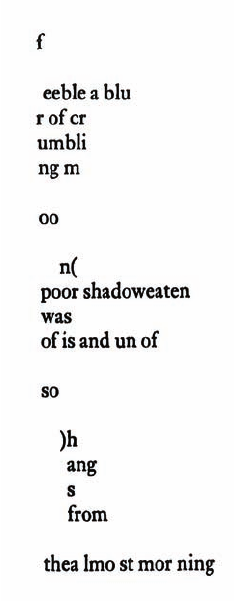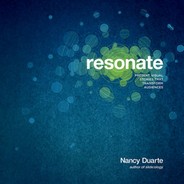228 Resonate
E. E. Cummings was an American poet, painter, essayist,
author, and playwright. He graduated from Harvard magna
cum laude and then continued (still at Harvard) to get a
Master’s degree in English and Classical Studies. He loved
writing, so to become a better writer, he signed up for
an advanced composition class where his teacher taught
him how to make his writing clearer, more precise, and
less wordy. Cummings practiced writing until his wrist
hurt.
9
Even though he was considered an avant-garde
poet, much of his work falls within traditional poetic
forms. For example, many of his poems are sonnets (but
with a modern twist), and he occasionally made use of
the blues form and acrostic poems.
Cummings knew the right way to write. He didn’t break
the rules until he fully understood them. Cummings
continually asked himself, “What else can language
be made to do?”
10
He combined his love for poetry and art by using the text
itself as a form. He tore words apart as a way of separating
letters and the sounds of syllables from their meaning. He
also stretched out words and used punctuation marks
and capital letters to add meaning or create visual and
aural effects. He forced readers to read slowly, to relish
sounds as they gradually put the words back together
and discovered what the poems truly meant.
11
The public did not initially enjoy his work—he broke too
many rules, and his ideas were too far out for the general
public to consume. For decades, he was reviled by the
Case Study: E. E. Cummings
Break the Rules
poetry community, and he struggled to make ends meet.
As he eagerly submitted poetry to publishers, one after
another told him, “No thanks.” After fourteen publishers
turned down his book, he printed it himself. He called it
No Thanks, and in it he printed the names of the fourteen
publishers who had rejected him in a list shaped like a
funeral urn.
12
It wasn’t until he was fifty-six years old that his poetry
began to get the recognition that it deserved. As his
career picked up momentum, he traveled and conducted
readings of his poems to packed auditoriums, becoming
the best-known poet in the United States. No American
poet has ever been more playful than Cummings, and
none have been more skillful at arranging words on
a page. Many poets have imitated his style, but their
attempts only prove how difficult it is to master that
style.
13
He was a true revolutionary.
It’s important to know the rules so you understand how
to flex and even break them to create meaning.
Many of the people who changed the world broke the
rules and went against standard convention. They stood
out, were different, and were even reviled at times.
Sometimes an idea stands out so much it shocks people,
but that’s what it takes to be noticed. Your idea might ini-
tially be rejected—but take heart—persistence will move
it from rejected to considered and eventually adopted.
Communicate it until you know you’ve done everything
in your power to help your heroes on their journey.
CH010.indd 228CH010.indd 228 8/16/10 7:43:08 PM8/16/10 7:43:08 PM

Inspiration Is Everywhere 229
Sometimes Cummings
pried a word open with
a phrase wrapped in
parentheses to show that
two events or thoughts
were occurring at the
same time.
15
14
CH010.indd 229CH010.indd 229 8/16/10 7:43:08 PM8/16/10 7:43:08 PM

230 Resonate
During World War II, the
U.S. government rounded
up Japanese Americans
on the West Coast—many
of them U.S. citizens—and
forced them to live in prison
camps. Cummings’s outrage
found expression in poetry
that mimics intolerance
based on ignorance.
16
(If the meaning is unclear, try reading the lines aloud.)
17
CH010.indd 230CH010.indd 230 8/16/10 7:43:10 PM8/16/10 7:43:10 PM

Inspiration Is Everywhere 231
Cummings imagines his
mother and father in
Heaven. He leaves some
words unwritten, reminding
us of the way speech can
trail off into thought and
how words unspoken can
still be understood.
19
18
CH010.indd 231CH010.indd 231 8/16/10 7:43:10 PM8/16/10 7:43:10 PM
232 Resonate
Your ideas are potent. A single idea from the human mind can change the
world. Mozart, Hitchcock, and Cummings all revolutionized their fields by
exploring and developing new ideas that had never existed.
You have the opportunity to shape the future through your imagination.
Imagining a future where your idea has been implemented will keep you
inspired to communicate your idea passionately.
So be flexible, be visionary, and now go rewrite all the rules.
CH010.indd 232CH010.indd 232 8/16/10 7:43:11 PM8/16/10 7:43:11 PM
..................Content has been hidden....................
You can't read the all page of ebook, please click here login for view all page.
